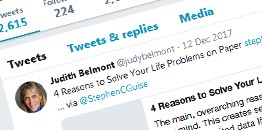
 Original article on pro.psychcentral.com
Original article on pro.psychcentral.com
It has never failed to amaze me in my many years as a therapist that no matter what type of problem a client presents – whether it be depression, anxiety, relationship problems, or stress management issues, the crux of the problems almost invariably lies in the shadow of low self-esteem. Self-esteem issues directly correlate to so many facets of mental health and life adjustment. The more persistent the symptoms, the lower the self-esteem. So whether you are a therapist, client or anyone wanting to get at the root of low moods, unhealthy thoughts, deep regrets, and debilitating anxiety, self-esteem is a good place to start. The following are 3 essential tips and tools to love yourself to love your life!
Tip #1: Realize that true self-esteem is not based on comparing yourself to anyone. Judgmental and conditional self-worth based on being better than others, or even being as good as them, will only serve to be a constant source of frustration and pain. They’ll always be someone who is smarter, more attractive, more clever, more popular, or has more money. For parents whose self worth is defined by their children’s above average ability and success, they’ll always be parents who have kids who finger paint better in pre-school, are better at soccer in middle school, get higher SAT scores in high school, get into to better colleges, or achieve more life success. Comparing yourself to others is a sure-fire way of never feeling quite at peace, as there are infinite comparisons to be made throughout life. Compare yourself only to where you were yesterday.
Activity: In order to find the value in what you have, rather than what you don’t, keep a gratitude journal. Being grateful for what you have is a self-esteem booster – focusing on what others have which you lack will make you bitter. Get better or bitter – which do you choose? An example of a gratitude journal is writing down every day at least ten things that you are grateful for which is not based on judgement and comparison to others. Stopping the comparison game and being grateful for what “is” will free your life up from a lifetime of resentment, negativity, and feelings of inadequacy.
Tip #2: Practice self-compassion to quell the inner bully. People who talk to themselves in a critical voice, label themselves as “stupid,” ugly” “lazy” or just plain “not good enough,” talk to themselves in a way that they would generally never talk to anyone else. Do you think that you’re a “loser” because you lost money on a business deal, chose the wrong college, didn’t listen to sound advice because you were sure you “knew better” or have you realized what you lost only when it was too late? I have witnessed all too many of my clients being a prisoner of their past, wasting precious time kicking themselves for missed opportunities or choosing roads that ended up in dead-ends. They remain stuck in a land of missed opportunities and regrets – and as we all know, the past never gets better.
Luckily, every problem has a solution. What’s the alternative to a life of beating yourself up? Self-compassion. This is truly the key to self-love. Forgive yourself for not having the foresight to know what you now know in hindsight. Being self- compassionate is being accepting, forgiving and loving towards oneself, despite all your life missteps. Got angry when you should have been grateful? Got envious when you should have been content? Retreated when you should have reached out? For self-compassionate people, they deepen instead of weaken with their misgivings. Instead of being stuck trying to figure out “why” you made what you see now as a dumb decision, how about focusing on “What’s next?” How about focusing on “What can I learn?”
Those who are self compassionate use life stumbles as a lesson to improve their lives NOW rather than defining themselves as among “life’s losers.”
Activity: Think of the top 5 of the most regretful decisions, actions or past missteps that just keep on coming back to haunt you. Draw a road on a piece of paper, and on this road, put in 5 roadblocks with signs on each one. Write on each roadblock the misstep, regret, or past action that gets in the way of cruising forward in your life. What defining moments are you still beating yourself up about? Visualize yourself driving on the road of your life, constantly being stalled by these roadblocks from the past. Rather than seeing the signs through the rear view mirror, moving past them, your life path is blocked front and center and it makes it hard to gain life traction and move forward.
Now imagine those roadblocks are only seen in your rear view mirror. Take a fresh piece of paper and make five new signs, but each sign is a positive takeaway from those regrettable acts and choices, and write what you have learned or write a goal based on those 5 roadblocks. For example, “I was such a jerk for losing my temper and screwing up my relationship and my life” can be transformed into a goal, “I am learning anger management techniques and working on improving my relationships now. I am learning to differentiate angry feelings and angry behaviors, and am working on communicating my anger more assertively and not aggressively.”
Tip #3: Crack the NUTS and Eliminate the ANTS!
Our self-defeating, self-esteem robbing self-talk has a life of its own. We tell ourselves stories that simply are not true. We use emotional reasoning when we feel down about ourselves that further our negative self-view, and our interpretation habits are so automatic that we treat our negative perceptions as facts.
Psychologists Elisha Goldstein, Aaron Beck and David Burns use catchy acronyms to help clients uncover and eliminate their unhealthy thoughts. Their “user-friendly” techniques offer visualizations to become more mindful of unhealthy thinking patterns.
In his book Uncovering Happiness, Goldstein uses the image of NUTS to refer to Negative Unconscious ThoughtS. He suggests that by being mindful of those intrusive thoughts, and by bringing them into awareness, we can stop driving ourselves “NUTS.” He found using this acronym injects some humor with his clients, who get a laugh out of the NUTS that are making them NUTS!
Beck used the acronym ANTS to refer to the Automatic Negative ThoughtS that result in anxiety and depression, leading to low self esteem and self doubt. Burns popularized this acronym in his book, Feeling Good: The New Mood Therapy. NUTS and ANTS sabotage self-esteem and happiness, and are characterized by the cognitive distortions, such as all or nothing thinking, jumping to conclusions, emotional reasoning and labeling.
Activity: Use this handout to identify your ANTS and NUTS that sabotage self- esteem. How can automatic thoughts be replaced with more rational alternatives? As you can see on this sheet, as you identify your ANTS and NUTS, separating fact from interpretation, it is helpful to identify the underlying cognitive distortion. For example, “I’ll never get over it” or “He’ll always hold a grudge” “I’ll never get it right.” is an example of the cognitive distortion of Fortune Telling (predicting the future as if it fact) and All or Nothing Thinking (perceiving things in black and white). For a more complete list of distortions, click here.
Using these 3 self-esteem boosting tips and activities will help alleviate the stress and depression that so often underlies low moods and anxiety. By actively changing the filter that we see ourselves, we can learn to be more stress resilient and positive about ourselves and our lives. We’ll meet life’s challenges from a position of strength rather than weakness. Therapists and clients alike will benefit from having these psycho-educational tools at their fingertips to love themselves and love their lives!



